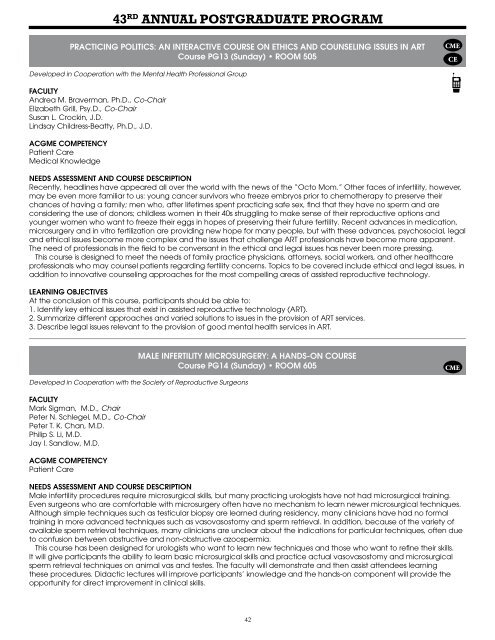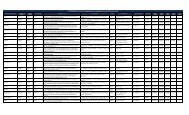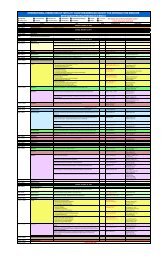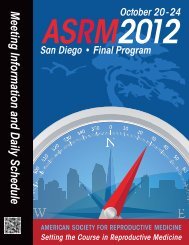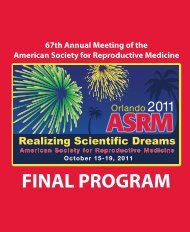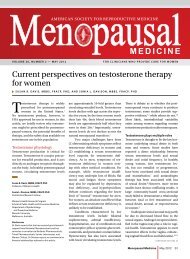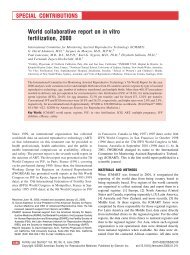scientific program • symposia - American Society for Reproductive ...
scientific program • symposia - American Society for Reproductive ...
scientific program • symposia - American Society for Reproductive ...
You also want an ePaper? Increase the reach of your titles
YUMPU automatically turns print PDFs into web optimized ePapers that Google loves.
43 RD ANNUAL POSTGRADUATE PROGRAM<br />
Developed in Cooperation with the Mental Health Professional Group<br />
FACULTY<br />
Andrea M. Braverman, Ph.D., Co-Chair<br />
Elizabeth Grill, Psy.D., Co-Chair<br />
Susan L. Crockin, J.D.<br />
Lindsay Childress-Beatty, Ph.D., J.D.<br />
ACGME COMPETENCY<br />
Patient Care<br />
Medical Knowledge<br />
NEEDS ASSESSMENT AND COURSE DESCRIPTION<br />
Recently, headlines have appeared all over the world with the news of the “Octo Mom.” Other faces of infertility, however,<br />
may be even more familiar to us: young cancer survivors who freeze embryos prior to chemotherapy to preserve their<br />
chances of having a family; men who, after lifetimes spent practicing safe sex, find that they have no sperm and are<br />
considering the use of donors; childless women in their 40s struggling to make sense of their reproductive options and<br />
younger women who want to freeze their eggs in hopes of preserving their future fertility. Recent advances in medication,<br />
microsurgery and in vitro fertilization are providing new hope <strong>for</strong> many people, but with these advances, psychosocial, legal<br />
and ethical issues become more complex and the issues that challenge ART professionals have become more apparent.<br />
The need of professionals in the field to be conversant in the ethical and legal issues has never been more pressing.<br />
This course is designed to meet the needs of family practice physicians, attorneys, social workers, and other healthcare<br />
professionals who may counsel patients regarding fertility concerns. Topics to be covered include ethical and legal issues, in<br />
addition to innovative counseling approaches <strong>for</strong> the most compelling areas of assisted reproductive technology.<br />
LEARNING OBJECTIVES<br />
At the conclusion of this course, participants should be able to:<br />
1. Identify key ethical issues that exist in assisted reproductive technology (ART).<br />
2. Summarize different approaches and varied solutions to issues in the provision of ART services.<br />
3. Describe legal issues relevant to the provision of good mental health services in ART.<br />
________________________________________________________________________________________________________________________<br />
Developed in Cooperation with the <strong>Society</strong> of <strong>Reproductive</strong> Surgeons<br />
FACULTY<br />
Mark Sigman, M.D., Chair<br />
Peter N. Schlegel, M.D., Co-Chair<br />
Peter T. K. Chan, M.D.<br />
Philip S. Li, M.D.<br />
Jay I. Sandlow, M.D.<br />
ACGME COMPETENCY<br />
Patient Care<br />
PRACTICING POLITICS: AN INTERACTIVE COURSE ON ETHICS AND COUNSELING ISSUES IN ART<br />
Course PG13 (Sunday) <strong>•</strong> ROOM 505<br />
MALE INFERTILITY MICROSURGERY: A HANDS-ON COURSE<br />
Course PG14 (Sunday) <strong>•</strong> ROOM 605<br />
NEEDS ASSESSMENT AND COURSE DESCRIPTION<br />
Male infertility procedures require microsurgical skills, but many practicing urologists have not had microsurgical training.<br />
Even surgeons who are com<strong>for</strong>table with microsurgery often have no mechanism to learn newer microsurgical techniques.<br />
Although simple techniques such as testicular biopsy are learned during residency, many clinicians have had no <strong>for</strong>mal<br />
training in more advanced techniques such as vasovasostomy and sperm retrieval. In addition, because of the variety of<br />
available sperm retrieval techniques, many clinicians are unclear about the indications <strong>for</strong> particular techniques, often due<br />
to confusion between obstructive and non-obstructive azoospermia.<br />
This course has been designed <strong>for</strong> urologists who want to learn new techniques and those who want to refine their skills.<br />
It will give participants the ability to learn basic microsurgical skills and practice actual vasovasostomy and microsurgical<br />
sperm retrieval techniques on animal vas and testes. The faculty will demonstrate and then assist attendees learning<br />
these procedures. Didactic lectures will improve participants’ knowledge and the hands-on component will provide the<br />
opportunity <strong>for</strong> direct improvement in clinical skills.<br />
42<br />
CME<br />
CE<br />
CME


